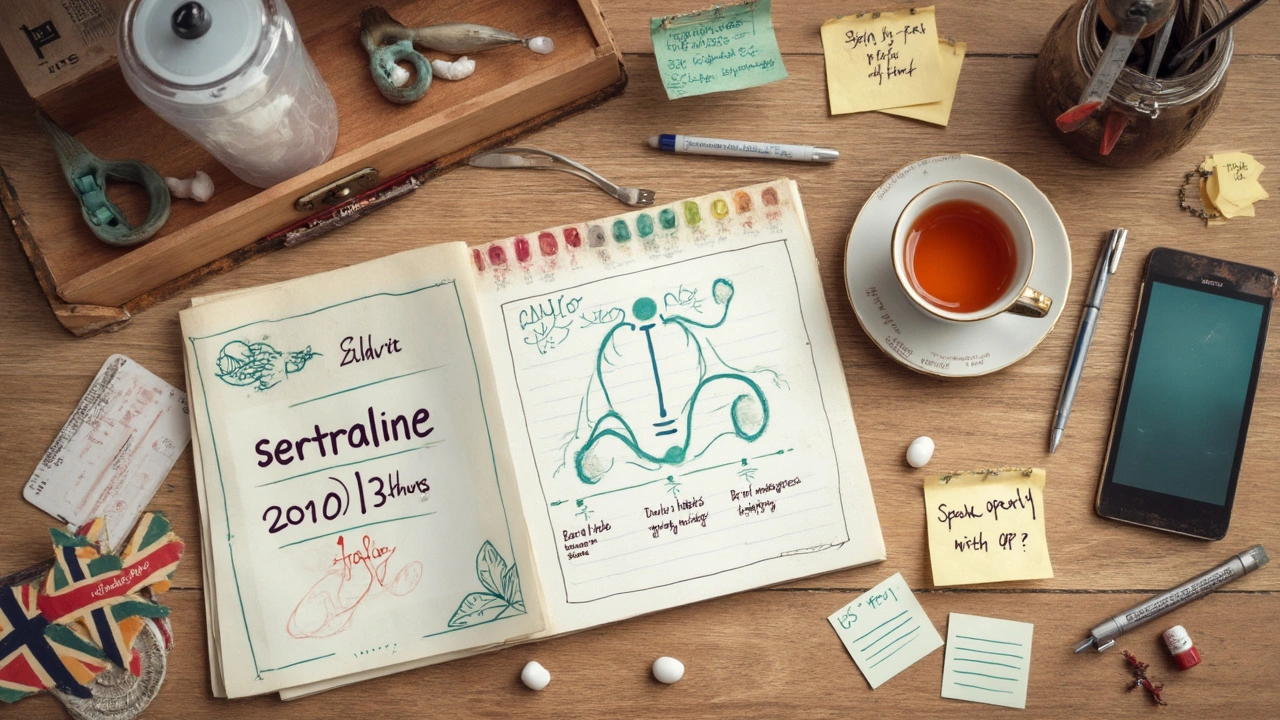Zoloft isn’t the kind of topic you stumble on during small talk at a café, but maybe it should be. Nearly 39 million Americans got an antidepressant prescription in 2024, with Zoloft—sertraline, if you like the chemical names—holding its ground as one of the top choices. For a lot of people, Zoloft has become a lifeline. Yet, ask anyone who’s considered starting it, and you’ll hear nervous questions. "Will it change my personality?" "What does it actually feel like?" "How long until I notice anything?" You probably know someone using it right now, possibly more than you realize. The reality is, the real scoop on Zoloft is buried under medical jargon and horror stories on social forums. It’s time to pull back the curtain and get real about what Zoloft is, what it does, and what it feels like to actually take it—straight-up, without sugarcoating or scare tactics.
What Exactly Is Zoloft and How Does It Work?
The science behind Zoloft can sound pretty dry, but here’s what matters: Zoloft is the brand name for sertraline, which falls under a class of drugs called SSRIs (selective serotonin reuptake inhibitors). SSRIs have one main job—help your brain keep more serotonin available. You’ve probably heard serotonin called the "feel-good chemical," but it does way more than just lift your mood. Serotonin is tied up in your sleep cycle, energy levels, appetite, focus, even how you experience pain. And yes, it’s crucial for how you handle stress. When your brain doesn’t keep enough serotonin handy, everything else can feel off.
So, how does Zoloft actually do all this? Imagine your neurons tossing serotonin back and forth like a ping pong ball. Usually, once a neuron releases serotonin, it reabsorbs it pretty fast. SSRIs like Zoloft block that "snap-back" move, leaving more serotonin floating around to do its job. That’s why it can take a few weeks before folks notice any changes—the boost is gradual, as your body finds its new groove.
Zoloft isn’t some emotional numbing stick. Its role is really about lifting the lowest floor—taking folks from barely able to get out of bed to "I can handle this." And it doesn’t just treat depression. Doctors write it for anxiety disorders, PTSD, OCD, panic attacks, and even things like premenstrual dysphoric disorder (PMDD). If you’re curious what the FDA says—it officially approved Zoloft back in 1991, making it a tried-and-tested favorite rather than a new experimental pill. With over 30 years under its belt, researchers have mountains of data on who benefits the most and what side effects to expect. Not many meds can claim that.
Who Is Zoloft For—and Who Should Avoid It?
If you ask a doctor who Zoloft is meant for, the answer is rarely simple. It’s used for major depressive disorder, but more folks these days get prescribed Zoloft for anxiety problems—think social anxiety, generalized anxiety (the "worry about worrying" type), panic disorder, OCD, PTSD, and PMDD. We’re talking about a medication that’s flexible, but there are some lines you don’t want to cross without a green light from your doctor. For example, kids and teens can take Zoloft for OCD, but not usually for depression unless there’s a compelling reason and careful monitoring. That’s because younger people have a slight increase in suicidal thoughts on SSRIs, especially when they first start.
Pregnant or breastfeeding? This is a territory where doctors are extremely cautious. Some studies say using Zoloft during pregnancy could slightly increase the risk of certain developmental issues, but untreated depression has its own risks—premature birth, low birth weight, and more. It’s all about balancing what matters most and working closely with a doctor who gets your full history. As for older adults, Zoloft is generally a safer pick compared to other antidepressants, but there is still a risk of hyponatremia (low sodium), which can be dangerous in that age group.
You definitely shouldn’t mix Zoloft with certain drugs—like MAO inhibitors, pimozide, or thioridazine—since that can spark pretty serious heart or serotonin-related problems. Recreational drugs and alcohol? Not a good combo, as they can mess with your mood, judgment, and the effectiveness of the medication. The same goes for St. John’s wort, an herbal supplement that is notorious for causing serotonin syndrome if it’s paired with Zoloft.
If you’ve got a history of bipolar disorder, doctors tend to be careful, too. Zoloft and other antidepressants can sometimes flip the switch from depression to mania. It’s also important to mention liver health—since Zoloft is processed by the liver, anyone with severe liver problems might need a lower dose or a different approach. Every case is different, so honest conversations with your provider matter more than ticking a checklist.

Common Side Effects and How to Manage Them
Here’s the honest truth: pretty much every medication has side effects, and Zoloft is no exception. The most talked-about side effects won’t surprise anyone who’s ever read a Zoloft prescription bottle—nausea, fatigue, dry mouth, diarrhea, and sometimes sexual side effects like lower libido or trouble reaching orgasm. A fair number of people even get a headache or notice they sweat more, especially at night, which makes you appreciate a cool pillow.
Most of these side effects crop up within the first couple of weeks. Your body is getting used to the new chemical balance, and it can feel rough. Nausea usually disappears after 7–10 days, but you can dodge the worst of it by taking Zoloft with food or right before bed. If dry mouth’s driving you nuts, sugar-free gum or sipping water often makes a difference. Fatigue or drowsiness? Try to take Zoloft at night, just before sleep, unless it keeps you awake—then, it’s worth switching to a morning routine. My own cat, Lydia, has witnessed me try every trick for handling that first-week fuzziness.
Sexual side effects can be more stubborn. They don’t hit everyone, but when they do, it’s frustrating. Strategies like switching the dosing time, lowering the dose with your doctor’s help, or sometimes adding another medication (like bupropion) can help. Don’t grin and bear it—have an honest chat with your doctor. Sometimes, changing the antidepressant is the best route. One myth worth busting: Zoloft usually doesn’t cause weight gain in the short term, but after months or years, a small amount of gain is possible. A study in the Journal of Clinical Psychiatry (2023) found about 10% of chronic users gained over 7% of their body weight after a year, though that’s much lower than with some other antidepressants.
| Side Effect | Frequency |
|---|---|
| Nausea | 25% |
| Insomnia | 19% |
| Sexual Dysfunction | 13% |
| Dry Mouth | 14% |
| Dizziness | 12% |
| Diarrhea | 20% |
Rare but serious risks worth knowing: A small number of people can respond very badly, like getting serotonin syndrome—a medical emergency linked to confusion, fever, rapid heart rate, or muscle stiffness. There are reports of increased suicidal thoughts, especially in the first month, for younger people. Don’t ignore wild mood swings or self-harm thoughts—call for help immediately. There’s also the odd chance of an allergic reaction, with swelling, rash, or trouble breathing, which needs ER attention right away.
Tips For Getting the Best Results With Zoloft
If you’re starting Zoloft, real-life strategies make a world of difference. First up, go slow. The usual advice: start with the lowest dose, often 25–50 mg daily, and bump up based on how you’re doing. Jumping quickly to a higher dose doesn’t speed up results—in fact, it’s more likely to dial up side effects. Stick to your schedule; taking Zoloft at the same time every day helps your brain adjust. I’ve found that tying it to another daily habit—like feeding Sam, my beagle—reduces the odds of forgetting.
Don’t expect instant magic. Most folks see improvements by week three or four, but for some, it can take up to six or even eight weeks. The first hints you’ll notice might not be "happiness," but things like sleeping better, eating with less trouble, or finding it easier to focus at work or school. Track your changes—writing down mood, sleep, and side effects every couple of days can help when you talk with your doctor. There’s no need for a fancy app. A notepad or the notes app on your phone works just as well.
Taper up, taper down. If you ever need to stop Zoloft (because it’s not working, you want to try something else, or doctor’s orders), slow and steady wins. Quitting cold turkey causes "discontinuation syndrome" in some people—this can look like dizziness, brain zaps, mood swings, and trouble sleeping. Your brain needs time to adapt back to its regular flow. That's one reason long-term check-ins with your provider matter so much. Missed a dose? If you catch it the same day, just take it. If you’re already at the next day, skip it rather than doubling up.
Avoid alcohol when you can; even a glass of wine can make side effects worse. Be picky with over-the-counter meds and supplements—always check with your doctor or pharmacist. And never mix with recreational drugs. Beyond meds, support from friends or therapy helps the process along. Studies in 2024 from Mayo Clinic showed folks combining Zoloft with talk therapy improved 15% faster than those using medication alone.
Remember, if something feels off—don’t just "wait it out." Your healthcare provider is the right person to tweak things, not internet strangers. If you’re ever unsure, always ask. No question is too small when it’s about your mental health.

Zoloft Experiences: What Real Users Report
Scan through Reddit threads or any support forum, and you’ll find every possible Zoloft story under the sun. One user says it helped her go from panic attacks at the grocery store to feeling calm enough to go to concerts again. Another will talk about feeling "really flat" for the first two weeks, only to find their spark coming back a month in. There are folks who felt wired and restless, and others who felt finally able to sleep for the first time in years.
The most common report? A slow burn. Users talk about realizing, after a few weeks, that they laughed at a joke, made new plans with friends, or didn’t fall apart after a rough workday. The "aha!" moment is rarely dramatic. More often, someone notices their dread isn’t swallowing them whole anymore. Some people notice side effects at first—my friend’s brother swore his appetite disappeared for a month, while Lydia (my astrophysicist of a cat) watched me try all sorts of crackers to dodge nausea. And some people just don't get much out of Zoloft, which can feel disappointing or even make them doubt themselves—usually, all it takes is a switch to another SSRI or a different strategy.
Then there are the honest, unfiltered experiences—like people who needed to lower the dose because of brain fog, or people who felt emotionally numb and had to talk it through with their doctors. It's not all sunshine and rainbows. But across every forum, you'll also find those people who say Zoloft gave them their life back—a chance to enjoy stuff again, to have energy for their kids, to sleep through the night, or just to stop feeling like a raw nerve in the world.
Here’s the secret sauce: Zoloft is a tool, not a cure-all. It works best when paired with real conversations—whether that’s therapy, family support, or even your local dog park crew if you’ve got a beagle like mine. The most important thing isn’t whether your experience matches someone else’s—it's about how you feel over time and what matters most to you. Give it a fair shot, go easy on yourself, and don’t settle for misery if things aren’t working. There’s always room to tweak, adjust, and find something that helps you feel like yourself again.


Write a comment